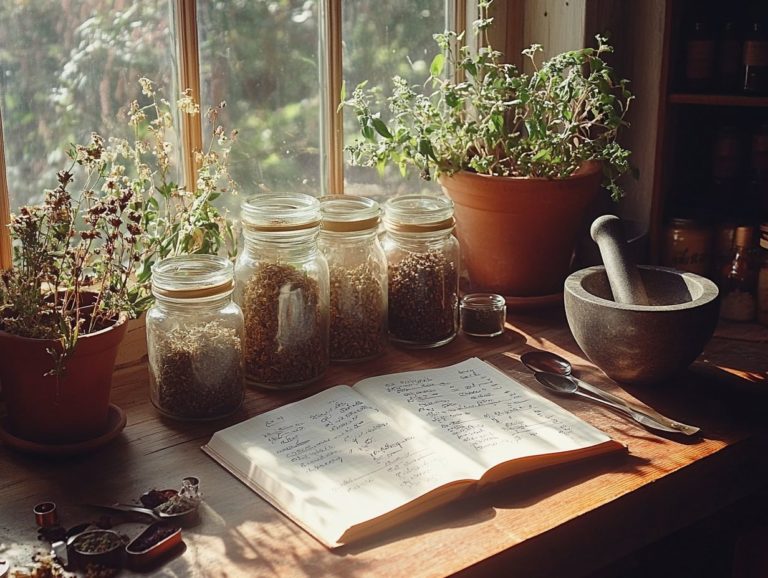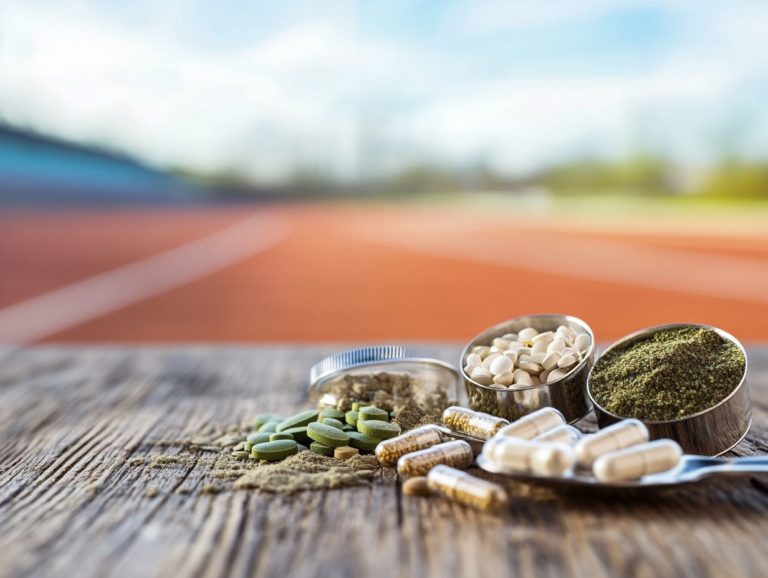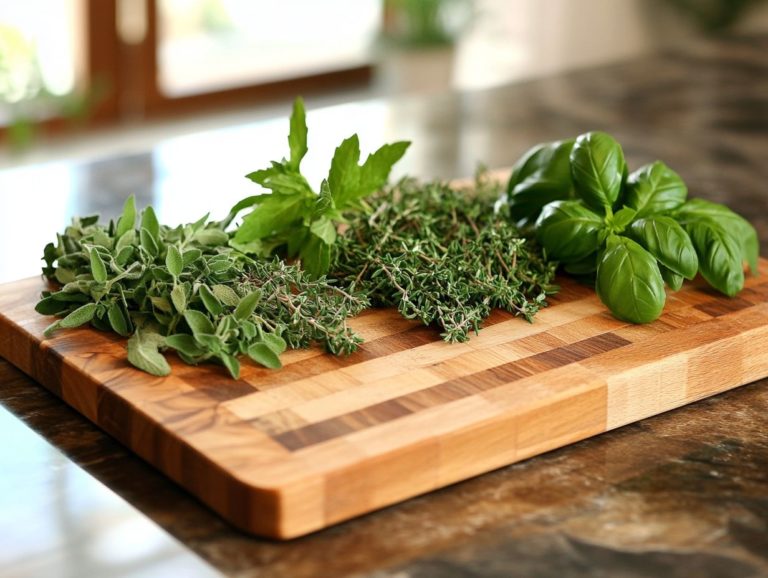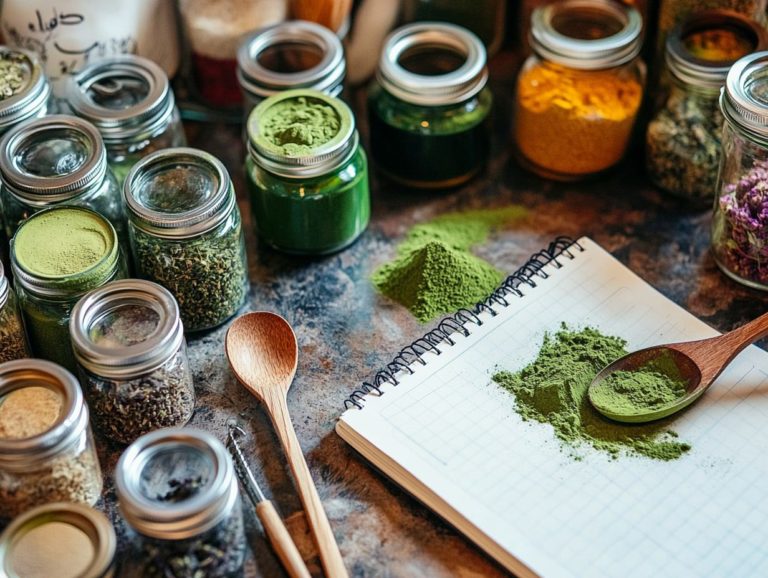Signs of Herbal Overdose: What to Look For
Herbal remedies are gaining popularity for their health benefits. However, they can pose serious risks if not used cautiously.
Understanding herbal overdose is vital for anyone exploring these natural treatments. This article will explain what herbal overdose is and highlight the signs to look out for.
You will also learn about effective treatment options and preventative measures to use herbal remedies safely. By the end, you’ll have the knowledge to protect your health while enjoying the benefits of herbal remedies.
Contents
- Key Takeaways:
- Understanding Herbal Overdose
- Common Signs and Symptoms
- Risk Factors for Herbal Overdose
- Treatment for Herbal Overdose
- Preventing Herbal Overdose
- Frequently Asked Questions
- What are the most common signs of herbal overdose?
- Can herbal overdose cause serious health problems?
- How can I tell if I have taken too much herbal medicine?
- What should I do if I suspect I have overdosed on herbal medicine?
- Are there any groups of people who may be more susceptible to herbal overdose?
- How can I prevent herbal overdose and vitamin overdose?
Key Takeaways:
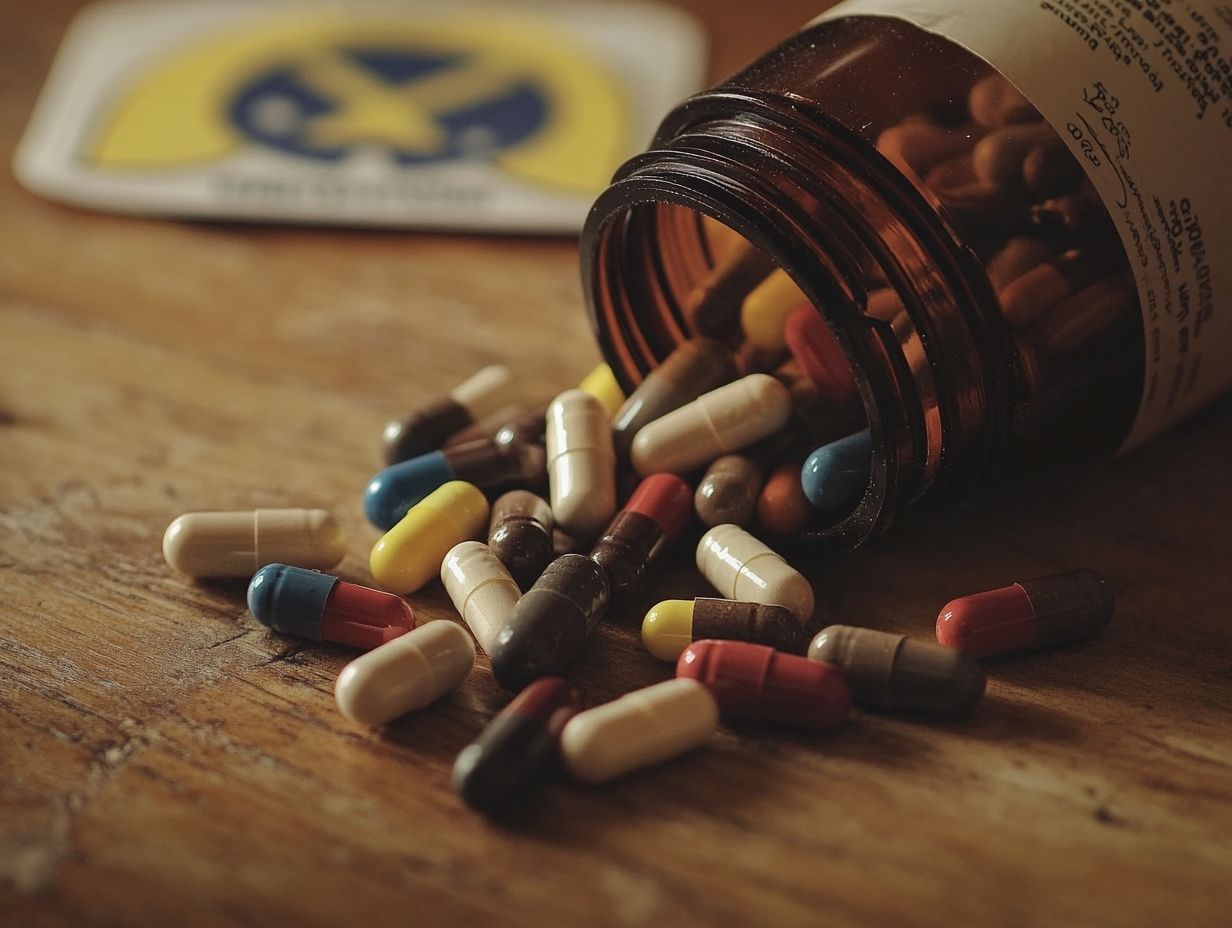
- Recognize the signs of herbal overdose, including physical and mental symptoms, to seek treatment quickly.
- Consider risk factors like pre-existing conditions and medication interactions when using herbal remedies.
- Prevent herbal overdose by practicing safe usage and monitoring your health regularly.
Understanding Herbal Overdose
In today’s health-focused society, understanding herbal overdose is essential. Many individuals are turning to herbal products and dietary supplements for their perceived health benefits.
An herbal overdose happens when someone takes too much of these products, which may require immediate medical attention. Knowing the signs of an overdose is crucial since many herbal supplements aren’t well-regulated by the FDA or the World Health Organization.
This lack of regulation means users might not be informed about toxic ingredients that could have harmful effects.
What is Herbal Overdose?
Herbal overdose occurs when you consume herbal products in quantities that exceed safe levels, leading to harmful or toxic effects.
This issue often arises from using too much of dietary supplements or the overconsumption of herbal medicine. Many people tend to view these natural products as entirely safe, overlooking potential interactions with prescribed medications or pre-existing health conditions.
Certain ingredients, such as kava or St. John’s Wort, can become particularly perilous in excess, potentially causing harm to your liver, which is a vital organ, or disrupting hormonal balances. Contaminants in poorly processed herbs, like heavy metals or pesticides, can also heighten these risks.
It’s crucial to get the right guidance to stay safe when using herbal remedies. Always be aware of dosage when incorporating herbal remedies into your health routine.
Common Signs and Symptoms
Be alert! The signs and symptoms of herbal overdose can vary significantly, impacting both your physical and mental well-being.
This may manifest as nausea, dizziness, or in severe instances, even liver failure.
Physical and Mental Indicators
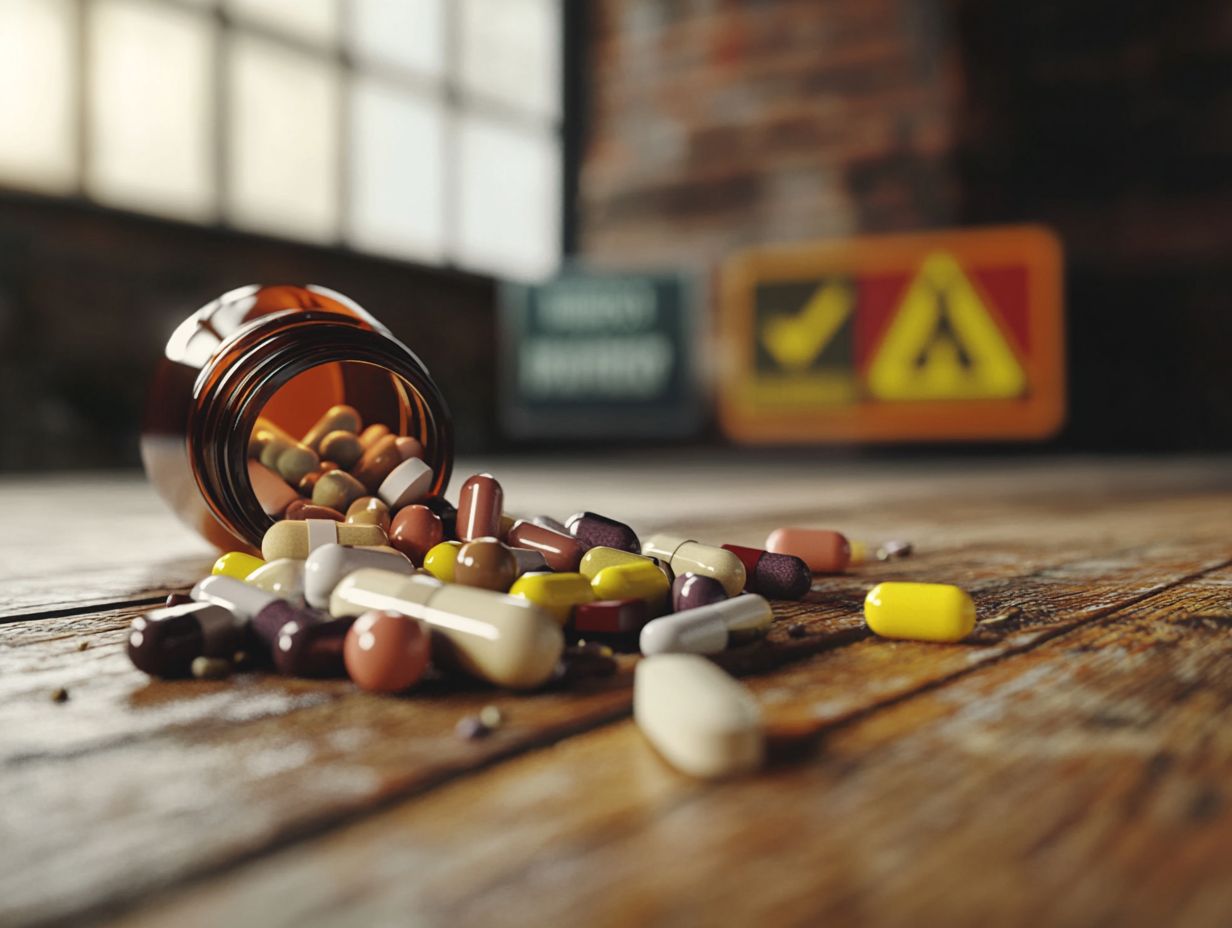
Physical indicators of herbal overdose can manifest as gastrointestinal discomfort, elevated blood pressure, and unusual fatigue. You might also notice mental changes such as confusion or anxiety. These symptoms often serve as vital warning signs that should not be ignored.
Take, for example, certain herbal products like St. John s Wort. They can trigger heightened feelings of restlessness or even manic episodes in sensitive individuals, which contrasts sharply with the more common physical symptoms like nausea or headaches. Then there are herbs like kava, which may produce both physical signs of liver strain and mental alterations, including disorientation or impaired motor skills.
Understanding this interplay is essential, as it underscores how herbal remedies can impact both body and mind, making it imperative for you to approach their usage with careful consideration and informed awareness.
If you have questions about herbal remedies, consult a healthcare professional!
Risk Factors for Herbal Overdose
Identifying the risk factors for herbal overdose is crucial, especially for those with existing health issues. Certain herbal products can interact adversely with medications, possibly escalating toxicity levels.
Being aware of these interactions will help you make informed choices about herbal supplements and protect your health.
Existing Health Issues and Interactions
If you have existing health issues like liver disease or hypertension, exercise caution with herbal medicine due to the potential for dangerous interactions with dietary supplements.
For instance, if you’re dealing with liver disease, herbs like kava or comfrey could worsen your condition, potentially leading to liver toxicity. If you have hypertension, be aware that certain supplements, like licorice root, can raise blood pressure levels, putting you in a risky position.
These interactions are not just hypothetical; real-world cases show how patients have faced significant health complications after mixing herbal remedies with prescription medications. Therefore, it s essential for you to consult a healthcare provider before adding herbal products to your regimen. This step is essential for your safety!
Treatment for Herbal Overdose
Immediate treatment for an herbal overdose is critical. It often requires swift action, including contacting Poison Control or seeking local emergency assistance.
These steps are vital to effectively mitigate the adverse effects experienced by the individual.
Emergency Measures and Long-Term Recovery
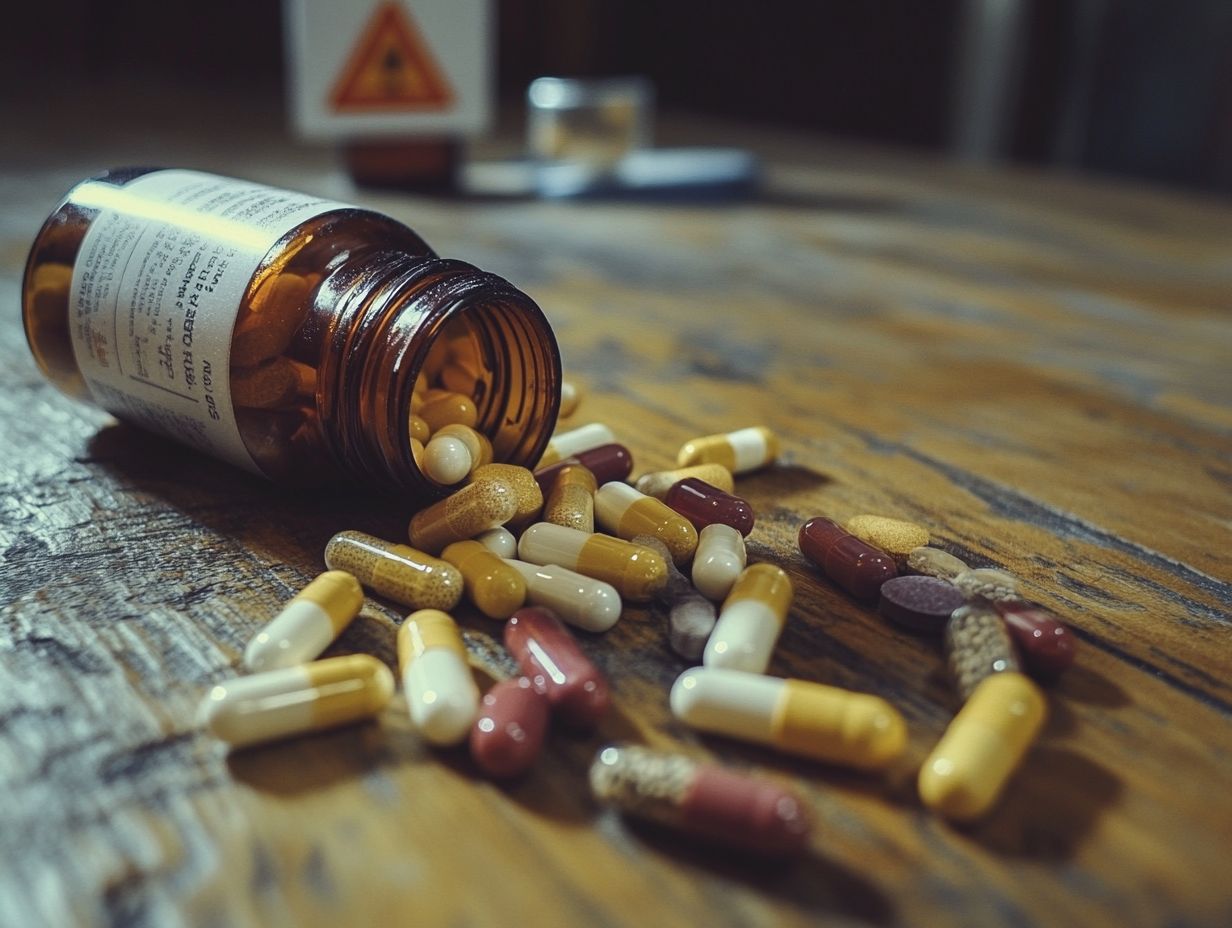
In case of an herbal overdose, your first course of action should be to contact the Poison Help hotline for immediate guidance, ensuring that the affected individual receives the necessary medical treatment.
During such critical moments, gathering detailed information about the herbal remedies consumed such as dosages and any existing health issues is essential. This information will be invaluable for medical professionals in delivering the best possible care.
After you ve taken immediate action, monitor the individual for any lingering effects, as some might experience delayed symptoms.
For long-term recovery, consider scheduling regular check-ups with healthcare providers to monitor any changes in health. Making lifestyle changes like maintaining a balanced diet, effective stress management techniques, and seeking counseling can be beneficial.
These proactive measures will help build resilience and significantly reduce the risk of future occurrences.
Preventing Herbal Overdose
Preventing herbal overdose demands your vigilance, especially through safe usage practices and careful monitoring techniques. By staying attentive, you can ensure that you never exceed the recommended dosages of herbal products and dietary supplements.
Your safety and well-being hinge on this awareness.
Safe Usage and Monitoring Techniques
Safe usage of herbal medicine and dietary supplements is essential. Employing monitoring techniques can significantly reduce the risk of overdose.
To effectively manage your dosages, familiarize yourself with the recommended amounts specific to each herbal product, as these can differ greatly. Keeping a detailed log of your consumption is crucial; this helps you track your daily intake and aids in identifying any adverse reactions that may emerge, including signs of herbal remedy allergies.
Consult healthcare professionals who can offer personalized guidance and adjust dosages based on your unique health conditions or medications. Engaging in open discussions about herbal products with a trusted physician ensures that any potential interactions with prescribed medicines are considered, promoting a safe and informed approach to whole-body wellness.
Frequently Asked Questions
Stay safe! Always consult your healthcare provider before starting any herbal regimen.
What are the most common signs of herbal overdose?
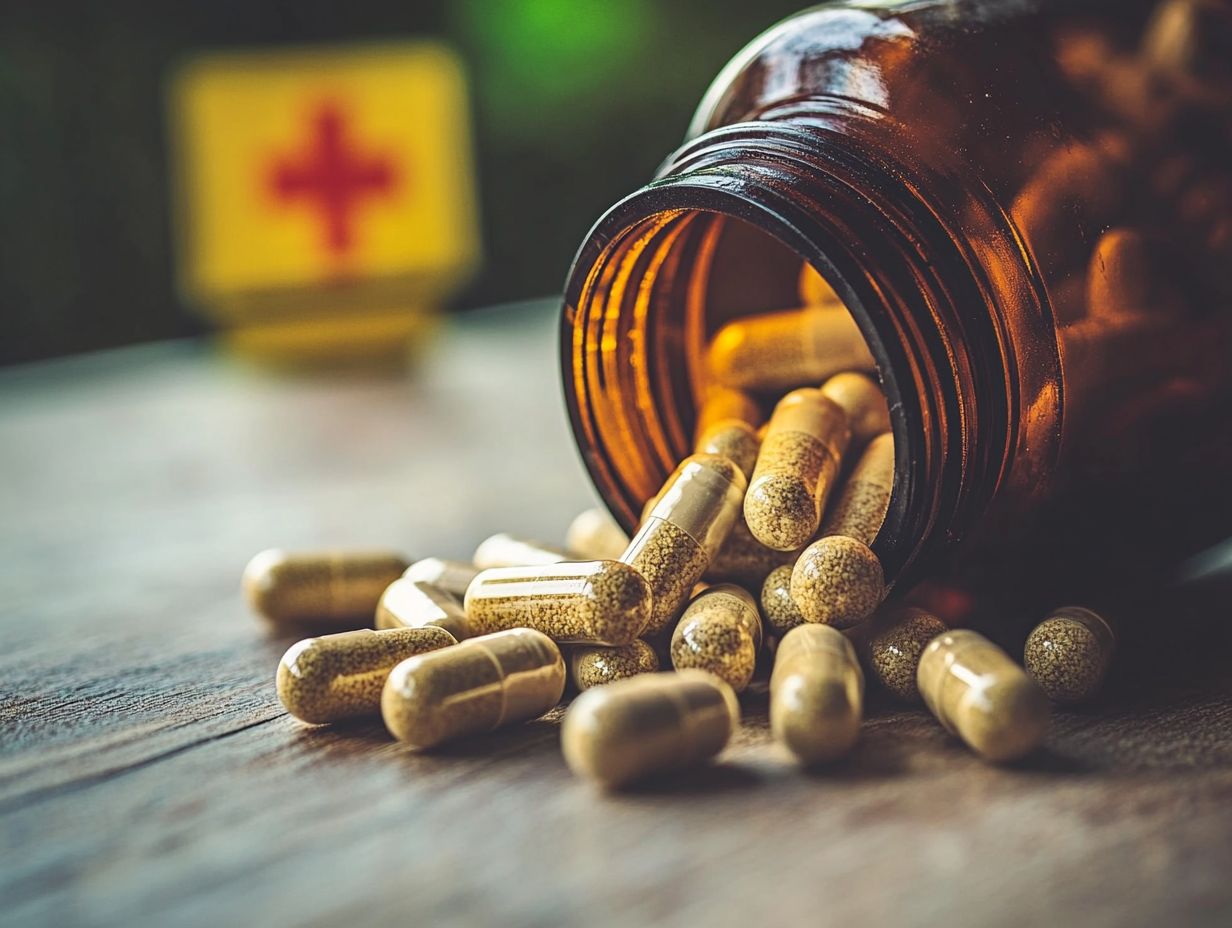
Common signs of herbal overdose include nausea and vomiting. You may also experience headaches, dizziness, and heart palpitations.
Can herbal overdose cause serious health problems?
Herbal overdose can lead to serious health issues. These include liver or kidney damage, allergic reactions, and even death.
How can I tell if I have taken too much herbal medicine?
Unexpected or severe symptoms after taking herbal medicine may indicate an overdose. Seek medical attention immediately.
What should I do if I suspect I have overdosed on herbal medicine?
Stop taking the herbal medicine right away if you suspect an overdose. Seek medical help as soon as possible.
Are there any groups of people who may be more susceptible to herbal overdose?
Certain groups are more at risk for herbal overdose. Pregnant women, children, and the elderly often have weaker immune systems.
How can I prevent herbal overdose and vitamin overdose?
Always follow the recommended dosage to prevent herbal overdose. Never exceed the advised amount.


